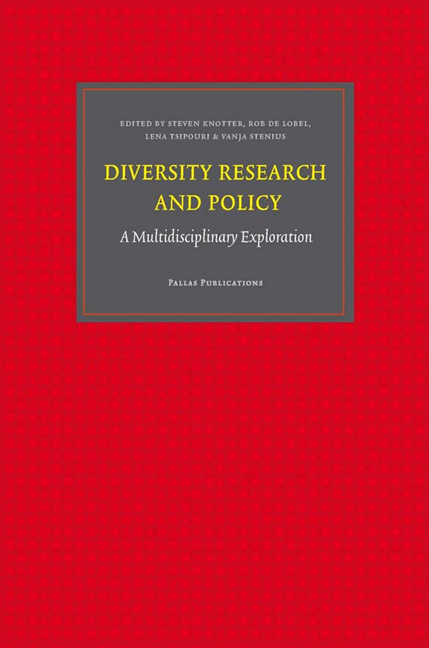Book contents
- Frontmatter
- Contents
- Acknowledgements
- 1 An Introduction
- 2 Diversity and Social Anthropology
- 3 Diversity and Sociology
- 4 Diversity and Criminology
- 5 Diversity and Ecology/Ecological Economics
- 6 Linguistic Diversity
- 7 Diversity and Architecture
- 8 Diversity and Urban Planning
- 9 Diversity and Economics
- 10 Diversity and Diversity Management in Business and Organisation Studies
- 11 Diversity and (Organisational) Psychology
- 12 Diversity and Law
- 13 Diversity and Public Policy
- 14 Conclusion
- About the Authors
- About the Reviewers
14 - Conclusion
Published online by Cambridge University Press: 15 January 2021
- Frontmatter
- Contents
- Acknowledgements
- 1 An Introduction
- 2 Diversity and Social Anthropology
- 3 Diversity and Sociology
- 4 Diversity and Criminology
- 5 Diversity and Ecology/Ecological Economics
- 6 Linguistic Diversity
- 7 Diversity and Architecture
- 8 Diversity and Urban Planning
- 9 Diversity and Economics
- 10 Diversity and Diversity Management in Business and Organisation Studies
- 11 Diversity and (Organisational) Psychology
- 12 Diversity and Law
- 13 Diversity and Public Policy
- 14 Conclusion
- About the Authors
- About the Reviewers
Summary
The Book
The original ambition of this book was to collect individual articles from as many disciplines (in social sciences and the humanities) as possible, identify their methodologies and perspectives on diversity and conclude with an interdisciplinary approach, suggesting common ways of perceiving, measuring and addressing diversity in terms of research and policy. Not all disciplines we wanted to include could finally be taken on board, and it was clear that true interdisciplinarity has not been reached yet. Still, many interesting conclusions could be drawn and some steps towards sharing were made.
Common conclusions were difficult to draw in the definition of diversity. Each discipline has its own refined concepts. There was general agreement that diversity is a part of nature and society, and that policies not understanding diversity are not sustainable. However, this was accompanied by many more disagreements on how the theoretical acceptance of diversity can and should be transposed into operational concepts, on where balances can be struck, and on what the role of civil society is in diversity. In that sense, agreeing on disagreement is a conclusion that is acceptable in the details of how to study and practice diversity.
Our methodological starting point referred to an effort to standardise the presentation of different chapters. The proposed structure for each chapter was to include a definition of the discipline, to focus on the meaning of diversity within the discipline, to examine diversity in policy and practice, and to conclude with a few words on the future of diversity within the discipline. Although this standardisation was helpful in certain aspects, it clearly emerged that some disciplines only contribute in the understanding and foundations of diversity (such as social anthropology and sociology), while others are much more policy oriented (economics, psychology). There are disciplines that explain diversity and relate it to social and human behaviours; for these, diversity is the dependent variable, and scholars within these disciplines try to identify how it emerges and what it means. For other disciplines, diversity is more an independent variable, an explanation of how it affects other dependent variables in social sciences and the humanities.
- Type
- Chapter
- Information
- Diversity Research and PolicyA Multidisciplinary Exploration, pp. 233 - 246Publisher: Amsterdam University PressPrint publication year: 2012



